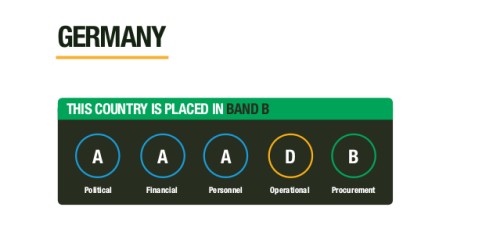Korruption im Verteidigungsbereich: Schlechte Noten für deutsche Auslandseinsätze
Die Anti-Korruptions-Organisation Transparency International hat sich die Verteidigungsausgaben verschiedener Länder im Hinblick auf die Korruptionsanfälligkeit angesehen. In der Spitzengruppe der Nicht-Anfälligkeit unter den G20-Staaten, mit Topnoten, rangiert Großbritannien – und Deutschland zusammen mit anderen Ländern wie den USA erst auf dem zweiten Rang. Der Grund liegt nicht unbedingt darin, dass die Organisation in Deutschland mehr Bestechlichkeit vermutet. Sondern in Unklarheiten bei den Auslandseinsätzen, wo folgerichtig (siehe oben) nur die Note D vergeben wurde.
Die Landes-Kurzübersicht für Deutschland in der Untersuchung:
• Robust and effective mechanisms for oversight are in place. All military deployments must be approved by the Bundestag, although this has been bypassed due to short deployment timelines in the past. There is some evidence of inclusive public dialogue on defence, if not much evidence of engagement with civil society on anti-corruption.
• High financial transparency. The mechanisms for oversight of “secret” budgets are the most well-defined among G20 countries.
• Anti-corruption is embedded as part of personnel culture. The Government Directive on the Prevention of Corruption in the Federal Administration provides for regular anti-corruption training, conduct standards for personnel, and additional layers of scrutiny for personnel in high-risk roles. Sanctions on corrupt personnel are effective and consistent; outcomes of judgements and court decisions are made public.
• Procurement risks are low, but where next with the ‘Transparency Initiative’? There is extensive regulation governing procurement, with an explicit focus on anti-corruption, though government audits highlighted the need for a more strategic approach. The 2014 report shows limitations in transparency and questions the necessity of some procurement; it is also unclear if audits of tender
board decisions are undertaken.
• Weak controls on operations. Despite an increasing awareness of corruption as a strategic issue, for example in Afghanistan, tackling corruption is judged as risky. Standards and training for anti-corruption on operations are needed. A transparent framework for regulating Private Military Companies is also needed, given the important supporting role these companies can play.
Und dieser letzte Punkt führt eben zur Abwertung.
Hinweis: Den Link zur kompletten Untersuchung trage ich nach, wenn sie veröffentlicht ist – eigentlich ist das ganze Material nämlich mit einer Sperrfrist bis heute Nacht versehen. Aber Transparency International hat offensichtlich mit einzelnen Medien Absprachen getroffen, nach denen die das vorher veröffentlichen können. Da muss ich mir ja nicht die Arbeit einer eigenen Berichterstattung machen; lässt sich alles bei tagesschau.de schon nachlesen: Auslandseinsätze wie geschmiert?
Nachtrag: der Link zur Untersuchung: http://government.defenceindex.org/




Braucht man wirklich nicht.
Was jetzt genau?
(wenn ich mir die Berichte des US-Sonderbeauftragten für den Wiederaufbau in Afghanistan – SIGAR – ansehe und was der an Geldverschwendung und Korruption zutage fördert, würde mich auch schon mal interessieren, wo in deutschen Auslandseinsätzen und damit zusammenhängend über die dortigen Ausgaben anderer Ministerien Geld verpulvert wird…)
T.Wiegold | 12. November 2015 – 22:10:
„Was jetzt genau?“
Die Luftblasen, die Sie hier als Kommentare erwarten dürfen.
@T.W.
dafür hätte es den Bericht nicht gebraucht…das da oftmals sinnlos Geld verpulvert wird ist hinreichend bekannt ;) Ob das Subsubsubunternehmer sind, bei denen der eigentliche Auftragnehmer abhaut und der Bund dann die Subsubsub*Unternehmer doppelt bezahlen muss, damit sie fertig bauen oder einfach deutsche Bauvorschriften sinnlos angewendet werden (Beispiel Straßenlaternen)… das man Schulen gebaut hat, die 1000% teurer waren als nötig wurde auch schon vor einer halben Dekade thematisiert…
Das ist noch lustiger;)
Für den Bau einer neuen Tankstelle in Afghanistan hat das US-amerikanische Verteidigungsministerium 43 Millionen Dollar anstelle von 500.000 Dollar ausgegeben….
http://www.ibtimes.com/pentagon-spends-43m-gas-station-afghanistan-project-should-have-cost-department-2165301
Wo auch immer dieses Geld hin ist, ein anderer hat es;)
Beim Lesen dieser „ibtimes“ News war mein erster Gedanke an den Film „Independence Day“. Zitat: „Sie glauben doch nicht wirklich, dass die 20.000$ für eine Klobrille ausgegeben haben…“
MkG
übrigens “ dass im Verteidigungssektor Großbritanniens das niedrigste Korruptionsrisiko “
da muss ich in Zusammenarbeit mit der britischen Verteidigungsindustrie einiges verpasst haben… das Gemauschel, welches ich da gesehen habe, hatte epische Ausmaße…
Da sollte man erst mal definieren was als Korruption bezeichnet wird.
Ist das grosse ‚Bakschisch‘ an die warlords damit sich die Mitarbeiter der Auslandshilfe im Lande ueberhaupt bewegen duerfen gemeint?
Oder die Zahlungen an die AFG Regierung um ueberhaupt taetig werden zu duerfen?
Oder der Kauf von Informationen?
Oder die Zahlung an den Dorfmullah um eine Schule bauen zu duerfen?
Innerhalb der Einsaetze seitens Soldaten und Zivilen Mitarneitern kommt mit Sicherheit keine Korruption vor.
Fazit: Da scheinen sich Sauber(mach)maenner primaer ueber procederes (audits) Sorgen zu machen, die nicht wissen dass ohne ‚Zuwendungen‘ in ganz Afrika und Asien nichts, aber auch garnichts laeuft.
Nein, auch nicht im hochgelobten Singapore!
UmPp | 12. November 2015 – 22:23
Naja… die Eisenbahnlinie nach Normalspur ist immer noch unübertroffen.
Da baut man nach westlichen Standardmaßen eine Gleisstrecke und dann, wenn sie fertig ist, fällt auf das man in der Region die russische Breitspur nutzt und die Strecke somit nutzlos ist.
Da hilft auch das wedeln mit der US Flagge nix mehr.
Das man in einem Land mit viel Sonne ein neues DIESEL !!! Kraftwerk baut ist halt typisch amerikanisches Militärdenken.
Dieselkraftwerke sind mit die teuerste Art Strom zu erzeugen. Für Afghanistan also top.
Ein Solarthermiekraftwerk aus deutscher Produktion wäre da schön gewesen.
Tagsüber Sonnenlicht auffangen, damit direkt arbeiten und Wärme in einem Solespeicher für den Nachtbetrieb sammeln wäre ja auch zu einfach.
Die Liste an Schlamperei und ‚anderen Dingen‘ ist da sehr sehr lang.
Bei der Tankstelle ist ja nicht nur der Preis fraglich, sondern auch der Nutzen, da es eine Gastankstelle ist.